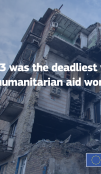EU solidarity: supporting institutionalized persons

“It was very difficult during the quarantine; we were confined to our rooms. We have been really waiting for you! Finally, volunteers can visit us,” with these words Anna, who lives in a Moscow psychoneurological residential facility, greets the volunteers of the ‘Ordinary childhood’ organization who has re-gained entry to the institutions under their patronage after a break of almost six months.
With a grant received from the European Union under the action “EU solidarity with Russian civil society: assistance to elderly people and adults with disabilities”, autonomous non-governmental organisation ‘Ordinary childhood’ has deployed 12 volunteers to two psychoneurological residential facilities in Moscow. The volunteers accompany their care recipients during the walks in the yards and parks, conduct weekly leisure activities, give creative classes, and provide psychological and legal advice. In addition, the ‘Ordinary childhood’ continues to provide an online support to its care recipients.
Another grantee of the EU solidarity action, the charity foundation ‘Maria’s children’ supports orphaned children and adults living in psychoneurological residential facilities.
“It is important that in the current difficult situation we are able to maintain contacts with our care recipients, in particular with those who live in institutions that have been closed now for more than six months due quarantine. These contacts include simple talks over phone, sharing of information about what is happening in our center, and online creative classes as well as online sessions with a logopedist or neuropsychologist. All these activities cheer up youngsters, bring diversity to their live, lift their spirits and distract them,” underlines Ekaterina Bianki, Executive Director of the ‘Maria’s children’ Foundation.
Thanks to the grant, 47 residents of psychoneurological facilities, 10 residents of orphanages, and 15 graduates from residential care facilities have participated in creative classes on art, modeling, cooking, and reading both online and off-line in the practice rooms of the Foundation.
The action “EU solidarity with Russian civil society: assistance to elderly people and adults with disabilities” is funded by the European Union and implemented by Charitable Foundation for Philanthropy Development CAF Russia. The action aims at helping elderly people and adults with disabilities in Russia to cope the COVID-19 pandemic crisis and its implications. Apart from the EU, the key donor of the action, individual contributions were made by Belgium, Estonia, France, Italy, Luxembourg, and Switzerland.
(Photo courtesy of “Ordinary childhood” organization)





